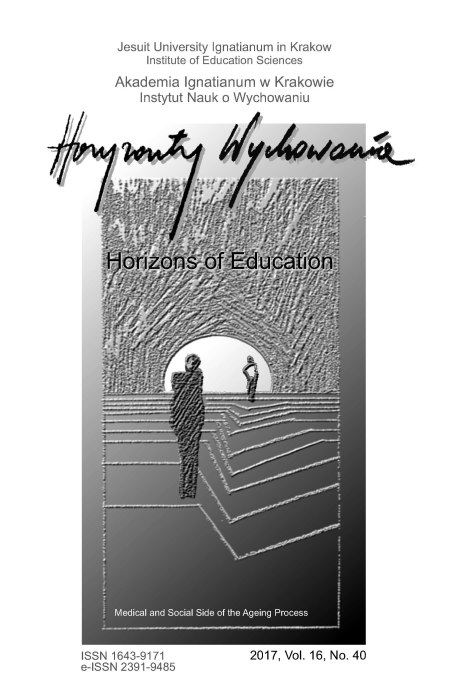Activity and Needs of Seniors – Research Report in Chorzów
Activity and Needs of Seniors – Research Report in Chorzów
Author(s): Piotr GierekSubject(s): Family and social welfare, Gerontology
Published by: Uniwersytet Ignatianum w Krakowie
Keywords: active; senior; leisure;
Summary/Abstract: RESEARCH OBJECTIVE: The aim of this study is to present seniors’ opinions about their activity and ways to meet seniors’ needs. THE RESEARCH PROBLEM AND METHODS: The research problem was centered around: participation in senior social life; forms of activity undertaken by seniors; ways to spend free time by seniors and the needs of the elderly. Survey was used as the research method. The studies were diagnostic and exploratory. THE PROCESS OF ARGUMENTATION: The progressive demographic change in Polish society makes active and active aging more active and the elderly’s needs for care and support become a major stimulus for satisfaction and quality of life. The article reviews the opinions of seniors about their activity and ways of meeting their needs. RESEARCH RESULTS: This study has shown that participation in social life, forms of activity and the needs of the elderly in various ways are met and implemented. Seniors indicating inactivity (in this study are mainly social welfare beneficiaries) generally declare that they feel socially excluded. These people choose a type of home and solitary activity, and spending their free time is mainly based on watching TV and listening to the radio. On the other hand, active seniors (in this study are mainly participants in senior clubs) are satisfied with their role in society. Free time is spent on meetings with people, e.g. in the club and prefer to take various activities. Research also shows that various forms of senior activism, including senior ones, have an impact on the quality of life of the elderly, significantly improving their activity, while addressing higher needs and counteracting social exclusion. CONCLUSIONS, INNOVATIONS AND RECOMENDATIONS: There is a need for more intensified action by aid institutions, directed towards seniors who are inactive, excluded – social welfare clients, so that they too can live in the “autumn of life.” Training should also be provided to social workers who equip them with the necessary knowledge and skills to work effectively with the seniors and to effectively and effectively reintegrate and reintegrate them.
Journal: Horyzonty Wychowania
- Issue Year: 16/2017
- Issue No: 40
- Page Range: 127-145
- Page Count: 19
- Language: English

